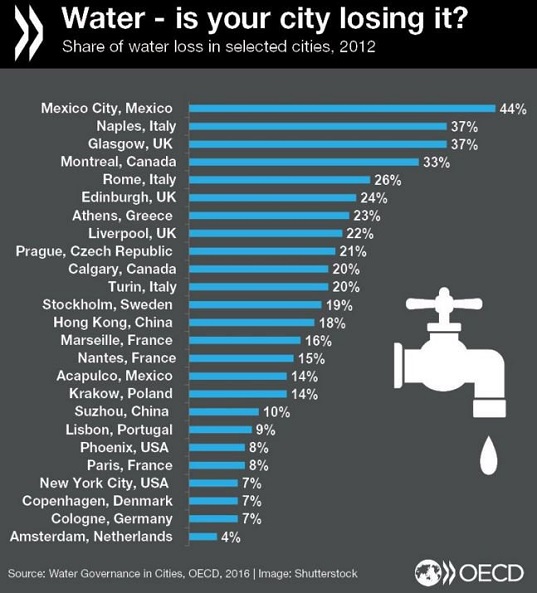Waste of water in cities
Misuse and misconsumption of water is one of the main problems in urban environments
The responsible use of water resources is one of the main challenges human beings face nowadays. The waste of water in the cities is, therefore, a big problem. The Organization for Economic Co-operation and Development (OECD) conducted a report on water wastage in a selection of 48 cities around the world based on water safety, supply, sanitation, wastewater treatment and drainage.
On a planet where water scarcity affects over 40% of the world's population, reducing unnecessary water usage is imperative to meet the sixth Sustainable Development Goal.
What cities waste more water?
According to the OECD report, the top ten selected cities for this ranking with the greatest percentage of managed water wasted are:

- Mexico City (Mexico) 44%
- Naples (Italy) 37%
- Glasgow (Scotland) 37%
- Montreal (Canada) 33%
- Rome (Italy) 26%
- Edinburgh (Scotland) 24%
- Athens (Greece) 23%
- Liverpool (England) 22%
- Prague (Czech Republic) 21%
- Calgary (Canada) 20%
How is water wasted in cities?
The main cause of water waste in cities is often poor infrastructure, although many other factors influence the scarce use of water. In Mexico City, for example, where almost half of the water is wasted, poor water quality, frequent floodings, lack of irrigation (irrigation systems), an obsolete pumping system - up to 70 years old in some sectors and manufactured with materials classified as carcinogenic by the World Health Organization (WHO)- frequent leaks and poor utilization of rainwater combine.
Shared management better than centralized
Besides the structural condition of the water supply and disposal systems, the public administration of the service is also of significant influence. According to the OECD, water use is more optimized in cities where management is divided between various public and private actors: from municipal to national government, with the intervention of private companies, and they cite examples such as Germany or Norway, where different management models, especially in the treatment of used water, greatly reduces waste.
On the contrary, the data shows that municipalities where water management has been decentralized have more deficiencies when it comes to making good use of the water cycle in the urban environment.
The alarming case of water management in Naples
Naples wastes 37% of the water it manages according to the OECD. However, the biggest problem of the Italian city is the condition of the liquid element. A devastating report by the US military, which has a base in the area, says that 92% of private wells and 57% of taps in the city center pose "an unacceptable risk" to health, and urge their soldiers not to use running water "not even to wash their teeth".
The United States locates the problem of this controversial report in the water treatment of the cities, suspected of being managed by the Neapolitan Camorra for the last two decades, of which they say that has not complied with the current biosanitary standards.
Once again administrative management becomes a problem that not only causes the poor use of water, but also puts at risk the health of consumers.
Sources: Water Governance in Cities, El País and Hoy.







